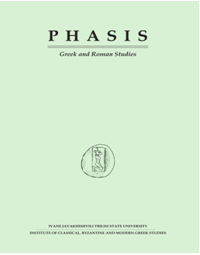Temporal Adjectives in Ancient Greek
DOI:
https://doi.org/10.60131/phasis.17.2014.2302Abstract
The concept of time is an important component of any individual’s picture of the world, as it is an absolute attribute of matter. The forming in the conscious of definite views of time and these views’ representation on the different levels of language on the different stage of its development depends on the kind and the way of perception, as well as on objective features of the language. In the works, devoted to the category of time, it is the semantic interaction of tense forms of the verb and the other means of time relation’s expressing that are more often analyzed. The question of differentiation of two language paradigms of ‚grammar tense‛ and ‚lexical time‛ is rather topical. The concept of time on the logical level was realized in different groups of lexemes, particularly in the system of adjectives. The features of adjectives according to their vocabulary, world-building structure and semantics are peculiar for every single language and reflect, in particular, the character of cognitive activity and fixation of its results by a human. Copious vocabulary of Ancient Greek contains valuable information about the way of world perception as a whole and time in peculiar. To understand such encoded information the deep analysis of lexeme from the point of view of their semantics, quantitative indexes, filling of single lexical-semantic groups and worldbuilding structures is necessary. Generalization of findings will allow understanding of what and how exactly was named by Ancient Greek speakers, in what quantity of elements important information of environment was fixed. The analysis of the semantic and world-building structure of temporal adjectives, studying of particular components of these structures in their correlation gives an opportunity to reconstruct the temporal picture of the world of Ancient Greeks, to identify its dominants and priorities.
Downloads
Published
Issue
Section
License
Copyright (c) 2014 PHASIS

This work is licensed under a Creative Commons Attribution-NonCommercial 4.0 International License.


